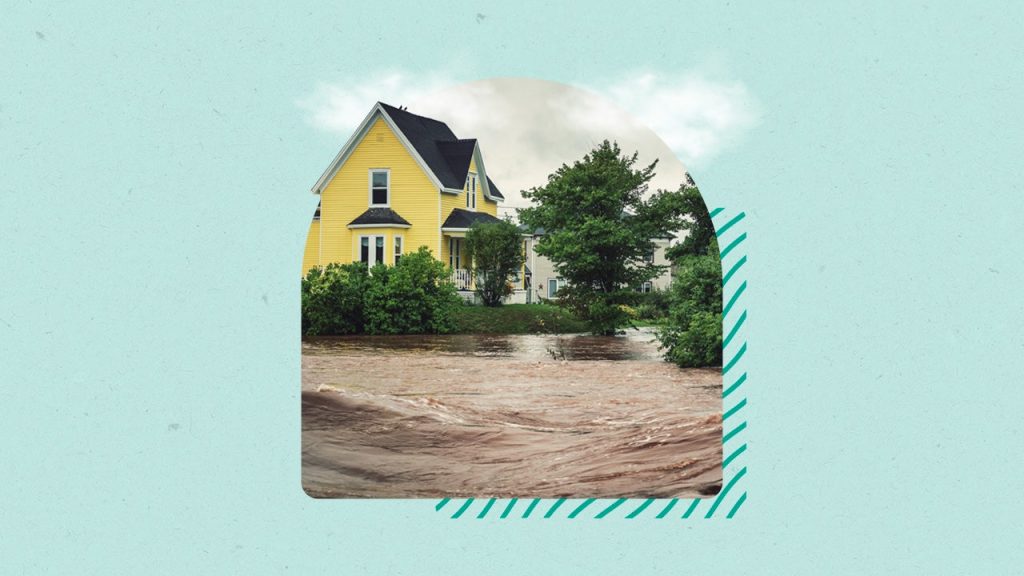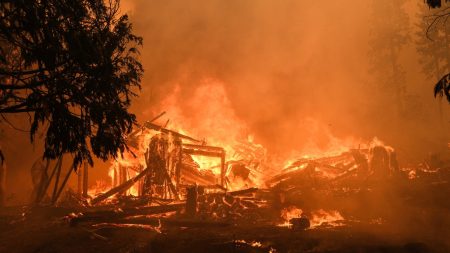Key takeaways
- Waterfront homes are a dream for many buyers, but they are more susceptible to flooding than homes located inland.
- Flood zones in the U.S. are designated by FEMA, the Federal Emergency Management Agency.
- Homes in high-risk flood zones typically require special flood insurance policies, which are separate from regular homeowners insurance.
So, you’ve found a home you love and are ready to make an offer. Maybe it’s right on the beach, or comes with a view of a beautiful lake. The only catch? It’s in a flood zone, so the likelihood you’ll end up dealing with a flood event is higher than usual.
Before buying a house in a flood zone, it’s important to know the risks and costs involved — especially with the increase in extreme weather in recent years. Purchasing flood insurance may help buyers feel more comfortable, and in some cases, doing so will be mandatory. Here’s everything to consider before buying a house in a flood zone.
What is a flood zone, anyway?
A flood zone is a geographic area that the Federal Emergency Management Agency (FEMA) has defined according to its level of flooding risk. FEMA has designated several flood zones, including moderate- to low-risk areas, high-risk areas and undetermined risk areas. These designations also fall into two categories:
- Special Flood Hazard Areas (SFHAs), which include designated zones beginning with the letters A or V. These areas carry at least a one-in-four chance of flooding during the lifespan of a 30-year mortgage, according to FEMA.
- Non-SFHAs, which are moderate- to low-risk areas shown on flood maps as zones beginning with the letters B, C or X. These zones receive one-third of federal disaster assistance related to flooding, FEMA reports.
Is this house in a flood zone? How to find out
It’s not difficult to find out if a property you’re interested in is located within a designated flood zone. Simply visit FEMA’s Flood Map Service Center and search using the property’s address. Your real estate agent should also know. If the answer is yes, find out which zone it is and what that designation means.
Regardless of where you start your search, it’s smart to get the info from more than one place: “I’ve learned not to trust [just] a single source,” says Florida real estate agent Mark Wei. “Start with official flood maps, but dig deeper. Local county records often tell a different story. I also recommend checking elevation certificates — they’re more reliable than any map, because they show exactly how high the building sits relative to potential flood levels.”
It’s a good idea to seek out this information early in the homebuying process, well before you make an offer on a home. You should also have your insurance agent search the claim history on the house so you know if it has suffered any previous damage, and how much. (If it has, let the seller know that you know about the previous claim history — it can be a good negotiating tactic.)
And once you’ve made an offer, it’s wise to have a thorough home inspection conducted. This can reveal any hidden red flags, including drainage issues or signs of existing or previous flood damage. Instruct the inspector to look for signs of previous water damage and the adequacy of repairs.
Risks of buying a house in a flood zone
While there’s plenty to love about waterfront living, it’s important to be aware of the inherent risks of buying property in those areas, especially as it relates to potential flooding and property damage.
For starters, you’ll want to understand what exactly it means to buy a home in a designated flood zone. There are several different types of flood zones, with the most common being zones A and V. Zone A is defined as being in a low-lying area and close to a body of water, like a lake. Zone V homes are in coastal regions and may be exposed to flash floods, hurricanes and other weather that can lead to water exposure and weather-related hazards. The highest-risk areas are defined by FEMA as having a 1 percent chance annually of experiencing flooding, and a 26 percent chance over the course of a 30-year mortgage.
Keep in mind that buying a home in a low or moderate-risk area instead of a high-risk area does not guarantee that you’ll be free of flooding, just that the risk is lower. It’s simply a matter of probability, and changing climate conditions can lead to regions becoming more susceptible to flooding over time. But if you’re in a higher-risk area, expect to pay more for flood insurance — your location’s flood-zone designation is one of the factors that determines your insurance premium.
The average annual cost for a flood policy from the National Flood Insurance Program (NFIP), which is administered by FEMA, is $800. But the premium you pay can vary depending on your location, and it may not cover 100 percent of your costs to remediate flood damage or rebuild your home.
Even if you have ample insurance coverage, a flooding event can be extremely disruptive and stressful. Expect the claims process to be more complicated and take longer than other types of insurance claims, and if you end up with severe damage, you may have to move out of your home to have it properly repaired. Flood insurance does not cover the cost of temporary housing. There is also the potential that you’ll need to evacuate the home quickly if a major disaster is imminent, with no guarantee of when you might be allowed to return.
Do you need flood insurance?
If your home is in a flood zone, absolutely. The need for flood insurance when buying a house in a flood zone is critical, and if the home you’re buying is in an SFHA high-risk zone, your mortgage lender will likely require it. This becomes especially important if you’re applying for government-insured mortgages like FHA loans, or conventional loans supported by Fannie Mae or Freddie Mac.
- Don’t assume that your regular homeowners insurance policy will cover flood damage — most do not.
Even if your lender doesn’t mandate it, flood insurance can provide you with a sense of security. Flooding can cause extensive damage to a home, ranging from mold growth to significant structural damage. Even one inch of floodwater can lead to a staggering $25,000 in damage, according to FEMA.
The NFIP provides most residential flood coverage in the U.S. NFIP coverage is not available everywhere, though — in the areas where it is not available, borrowers may be able to purchase flood insurance from a private insurer.
The last thing you want to do is assume that your regular homeowners insurance policy will cover flood damage — chances are, it won’t. “Get your flood insurance quotes before making an offer [on the house],” says Wei. “I’ve seen too many deals collapse during underwriting because buyers weren’t prepared for the insurance costs.”
Is a home in a flood zone harder to sell?
Selling a home in a high-risk flood zone can present unique challenges. The property’s flood-zone status can affect its market value, even if the home has never actually suffered flood damage, and it may also take longer to find a buyer when you want to sell. Owning a home in a flood-prone area can be seen as a gamble and often means higher insurance costs.
“Climate-change awareness has made buyers more cautious, especially in coastal areas, and I’m seeing longer selling times for flood-zone properties,” says Wei.You also may not get the price you think the home is worth. “I’ve seen gorgeous waterfront properties sell for 20 to 30 percent less than similar homes in non-flood areas,” says Wei. “The views and lifestyle are incredible, but you’re paying in other ways.”
However, despite the challenges, waterfront properties do eventually tend to find their buyers. “Location still trumps everything,” says Wei. “A well-maintained waterfront property with proper flood mitigation will always find a buyer. The key is being transparent about flood risks and having all documentation ready.
”This kind of transparency with prospective buyers is crucial. Be prepared to share details about potential flood threats, and how climate change or rising water levels could affect the property. In fact, most states require you to disclose your property’s flood status to potential buyers. The National Association of Realtors has a state-by-state map of flood disclosure requirements, so you can look up exactly what kind of disclosures are required where you live. In many states, real estate brokers have disclosure obligations covering flood risk as well.
Getting a mortgage for a house in a flood zone
Homeowners with a government-issued mortgage, such as FHA, USDA or VA loans, are required to have flood insurance coverage if their property is in a high-risk flood zone. If you’re applying for a conventional non-government mortgage offered by a private lender, or if the home you’re eyeing is in a non-SFHA zone, your lender likely won’t require flood insurance, but it may still be recommended. Assuming you obtain flood insurance as required, buying a home in a flood zone shouldn’t preclude you from securing any mortgage loan you qualify for.
Questions to ask
So, is it worth buying a house in a flood zone? It can be, especially if you love the waterfront lifestyle. But it depends on a few factors. As a homeowner in a flood zone, it’s important to be aware of the risks, and also to have the means to afford both homeowners insurance and flood insurance on top of your regular mortgage payments. You should also set aside extra cash for home repairs related to potential flooding events.
You should be willing and prepared to take flooding precautions if necessary, and know how to determine that the home for sale is priced correctly based on its location in a flood zone. One way to do this is by looking at sales of similar homes in the same zone. Another is to work with a local real estate agent who knows the area.
If you’re considering buying a house in a flood zone, here are the important questions to ask:
- Where is this property positioned on the existing flood map?
- What’s the classification of the flood zone for this home?
- How frequently does flooding occur on the property?
- What flood prevention measures have been implemented on this property, and within the local community?
- How much will flood insurance cost? Can I afford this additional cost?
Read the full article here












